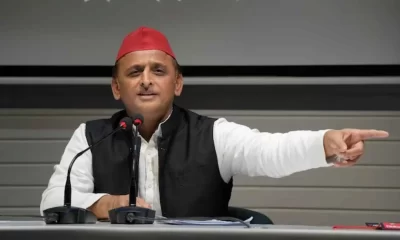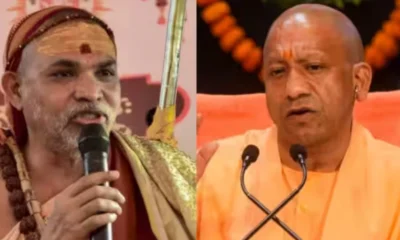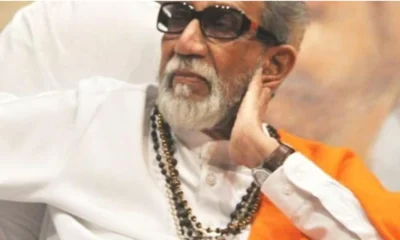[vc_row][vc_column][vc_column_text]Tension hung heavy on Ayodhya on the eve of the Sangh parivar’s big push tomorrow, Nov 25, for construction of Ram temple at the disputed site where Babri mosque was demolished 26 years ago
According to their claims, over two lakh workers of various outfits affiliated to RSS would descend on the temple town for RSS’ militant Hindutva offshoot Vishwa Hindu Parishad’s (VHP) Dharma Sabha. Many would be dressed as Lord Shiva and wielding tridents. Contingents of sadhus and seers are also expected. Senior RSS leaders, including Sahkaryawah Bhaiyyaji Joshi, have been monitoring the preparations and strategy to mobilise people.
Far-right Hindutva workers, sevaks and sainiks are being brought together for a massive and belligerent show of strength in a mobilisation months before the Lok Sabha election of 2019 to build the background for the BJP government at the Centre to move on the Ram temple issue. Even slogans have been suitably tweaked, with the Shiv Sena calling for “pehle mandir phir sarkar” and VHP going from “mandir wahin banaenge” to “mandir jaldi banaenge”.
The RSS and VHP have planned 543 rallies over the course of the next few days, from November 25 to December 25, including a march of saints on December 9 in New Delhi, just three days before the winter session begins, to put pressure on the government – or provide it a ‘reason’ to bring a law to facilitate construction of Ram temple.
The political angle to gain electoral mileage was evident. Yogi Adityanath government took care to keep it a mainly Sangh parivar event and disallowed Shiv Sena chief Uddhav Thackeray’s plans for a rally. The Shiv Sena can participate in the Nov 25 event, though.
The intention is clear and has already been voiced by many: that there is no need to wait for the decision of the Supreme Court. To pay a token respect to the Constitution, there is demand, getting louder by the day, that the Modi government bring in a law for the purpose. This started after RSS chief Mohan Bhagwat pitched for a law to pave the way for Ram temple’s construction in Ayodhya.
If the Bill for this gets held up in Rajya Sabha, the Centre should bring in an Ordinance to this effect – as BJP lawmaker Ravindra Kushwaha is reported to have said.
There are also elements that feel temple construction can be done regardless, through sheer force of mass mobilisation: a replay of Babri mosque demolition on December 6, 1992. Construction, however, takes a much, much longer time than demolition.
Controversial BJP MLA Surendra Singh has warned that 1992 could be repeated in Ayodhya, if required.
Taking part in a rally to mobilise people for the event, the BJP lawmaker told reporters Thursday that 5,000 people from his constituency, Bariya, would travel to participate in the “Dharam Sabha” where the issue of Ram temple’s construction would be taken up by saffron outfits.
He said “law and order is not an issue as far as Lord Ram is concerned…he will take care of it”. Singh said if the need arose, they would take the law into their hands for the temple’s construction, like it was done in 1992 for the demolition of Babri mosque.
It is this fear of the charged mood turning into violence that grips the Muslims of the area and they have expressed their apprehensions openly.
Samajwadi Party president Akhilesh Yadav demanded that the Supreme Court should take note of the prevailing situation in Ayodhya and consider deploying Army to maintain peace and ensure security of the people.
“The BJP doesn’t believe in either the Supreme Court or the constitution. The party can go to any extent. The kind of environment there is in UP, especially in Ayodhya, the Supreme Court should take notice of it and send the Army if necessary,” said Akhilesh Yadav, the chief of the Samajwadi Party.
Apprehending a repeat of 1992 in Ayodhya, convener of the Babri Masjid Action Committee Zafaryab Jilani on Friday reposed faith in the state’s administrative machinery to ensure compliance of court’s order on the disputed site saying the state’s political leadership could not be trusted.
Iqbal Ansari, a party to the Ram Janambhoomi-Babri Masjid title dispute case in Supreme Court, said: “The district administration should ensure the safety of Muslims in view of the programmes organised by VHP and Shiv Sena.”
Amid reports that members of the minority community had started shifting to nearby towns and villages fearing violence, the district administration has deployed additional force in Muslim-dominated areas, reported The Hindustan Times (HT).
ADG (law and order) Anand Kumar said the state government had prepared a security scheme for Ayodhya and police force has been deployed accordingly, reported HT. The ADG said the Supreme Court order for the acquired area would be implemented and devotees would be allowed in batches for ‘darshan’ at makeshift temple.
A large contingent of police force, including the Border Security Force (BSF), Central Reserve Police Force (CRPF) and Rapid Action Force (RAF), has been deployed in the temple town along with 70 companies of the Provincial Armed Constabulary (PAC), Anti-Terrorist Squad (ATS) and 4,000 personnel of civil police to maintain law and order.
“The police force deployed in Ayodhya has been directed to remain on high alert. The entire district has been divided into eight zones and 16 sectors to strengthen security,” a senior officer told HT.
Ayodhya has turned into a virtual fortress with the state police beefing up security of the temple town, particularly at the disputed site. They have, however, allowed the devotees to have ‘darshan’ at the makeshift temple in small batches.
Faizabad district administration has imposed prohibitory orders (Section 144) in the Ram Janambhoomi-Babri Majid premises, a senior officer said.
The Uttar Pradesh Police has sounded a statewide alert amid apprehension of trouble during the Dharam Sabha.
Amid reports of the minority community feeling unsafe, reports quoted VHP sources as saying that rumours that minority groups were leaving town were being spread to “derail their movement for a Ram temple in Ayodhya”. Both the Shiv Sena and VHP have said they will take “responsibility” for their supporters. A senior RSS functionary said this would be the “last Dharm Sabha in Ayodhya” after which there would be “no more Dharm Sabhas, and construction of Ram temple would begin.”
In a statement, VHP regional organisational secretary Bholend said there would be no more congregations and the next stop for them would be the beginning of the temple’s construction.
“Ab mandir nirman ke liye sabhayein, pradarshan aur dharna ityadi nahin honge na hi virodhiyon ko samjhaya jayega…seedhe mandir nirman hoga (There would no longer be meetings, processions and protests for Ram temple, opponents will no longer be engaged with… There will only be temple construction),” he added.
This is the last time an effort is being made to make the people opposing the temple construction realise the facts, the VHP leader said. He also said that if all efforts fail, then “war” was the only way.
[/vc_column_text][/vc_column][/vc_row]


 India News22 hours ago
India News22 hours ago
 Cricket news22 hours ago
Cricket news22 hours ago
 India News21 hours ago
India News21 hours ago
 Latest world news9 hours ago
Latest world news9 hours ago
 Latest world news9 hours ago
Latest world news9 hours ago
 Latest world news8 hours ago
Latest world news8 hours ago
 India News8 hours ago
India News8 hours ago














